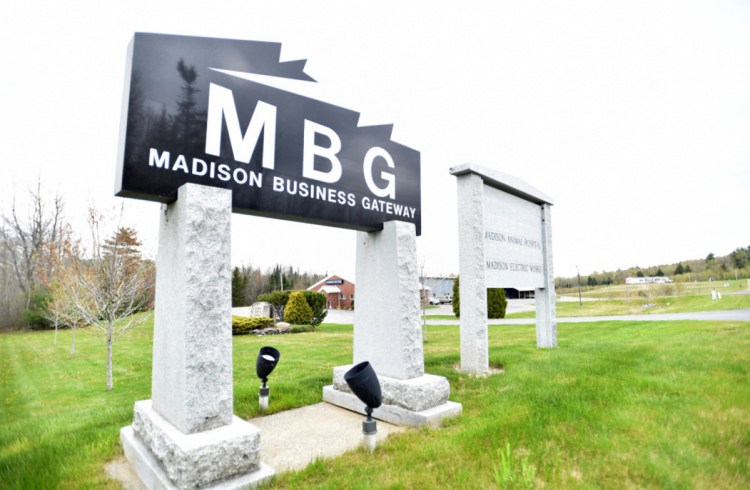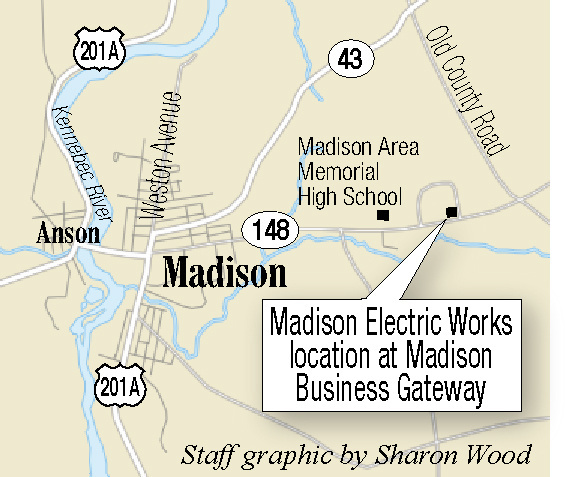MADISON — Strawberries are coming to town.
A Maine entrepreneur with ties to renewable energy projects in the state has landed a grant through the Northern Border Regional Commission and Madison Electric Works for a strawberry greenhouse on two lots in the Madison Business Gateway park, bringing 30 to 40 jobs to town and a boost to the local tax base.
The project will be awarded $310,000 to expand the town’s industrial park, which plans to include a new natural gas pipe, water treatment system, electrical transformers and 200 feet of new sewer and water lines, according to a joint news release from U.S. Senators Susan Collins, R-Maine, and Angus King, I-Maine.
Calvin Ames, Superintendent of Madison Electric Works, said the project will take up the two remaining lots at the park, next to a mammoth solar array that went on line last October.
“It’s a new business that’s going to grow strawberries in the business park,” Ames said by phone Tuesday. “They helped us apply for that grant. We did it specifically for them. It’s not like just general maintenance upgrades. This new infrastructure is going to feed that new greenhouse.”
The Northern Border Regional Commission is a federal-state partnership that was created by Congress in 2008 in order to help alleviate economic distress and encourage private-sector job creation throughout the northern counties of Maine, New Hampshire, Vermont and New York.
Ames said the project was initiated by Evan Coleman, of Clean Energy. Coleman is listed as the general manager of Clean Energy on the Buzzfile database website. Clear Energy is located in Marlborough, Massachusetts. The organization primarily operates in the energy research business industry within the engineering, accounting, research, and management services sector. The organization has been operating for about four years, according to the website.
Coleman’s name also has been associated with other solar and natural gas ventures in Maine.
Coleman did not respond immediately to a phone call and an email Tuesday seeking information on the company.
Madison Town Manager Tim Curtis said he has known Coleman for about two years and says he looks forward to the strawberry project. He said the town of Madison will not have to come up with any capital as a matching share in the project.
“This is a private venture,” Curtis said. “The town certainly supports it, but we’re not dedicating any funds for it.”
Curtis said Coleman was involved with the investors that built the 26,000-panel array IGS Solar project at the business park.
The array, which will generate enough electricity to power 700 homes, is spread over more than 20 acres at the Madison Business Gateway. Madison Electric Works, a department of the town of Madison, signed a 26-year agreement with Ohio-based IGS Solar to buy all the electricity produced by the array at a fixed rate of 7.99 cents per kilowatt. After six years, the utility will have the right to buy the energy farm at an estimated cost of about $6 million.
The farm generates enough electricity to satisfy the needs of about 20 percent of the district’s customers. Advanced Solar Products designed and managed the installation while subcontracting with Cianbro. The project originally was developed by Clear Energy, which then was secured by IGS Solar through a public bid process.
“I think it’s a great idea,” Curtis said. “Anything that we could do to make good use of the industrial park and use some of our infrastructure resources, like Madison Electric Works, is good. This provides jobs and a little tax revenue for the town. We’re all in favor of that.”
Ames said the project will take up the final two lots on the back side of the business park, covering an area of about 6 acres.
“It will be a big deal for Madison,” he said. “Because of the paper mill closing, it’s a big deal for us. The greenhouse itself will be on about 3 acres and the two lots they bought together is almost 6 acres; but some of it’s wet, so they can’t build on it. I believe there will be 30 to 40 full-time jobs.”
He said strawberries should be growing there by November.
Ames said the natural gas pipeline that went to Madison currently runs as far as the Hannaford supermarket on Route 148, so it will have to be extended another mile to serve the business park.
Backyard Farms, the town’s tomato producer, employs about 250 people.
Ames and Curtis both said the strawberry project is not going to replace the $200 million in taxable property and the jobs that were lost when Madison Paper closed, but it’s a good start.
They said the projected assessed value of the new business is in the $6 million range, generating about $125,000 worth of tax revenue.
“Every little bit of investment, every little bit of development helps,” Curtis said.
He said there has been no significant movement on finding buyers or tenants for the shuttered paper mill.
Doug Harlow — 612-2367
Twitter:@Doug_Harlow
Send questions/comments to the editors.




